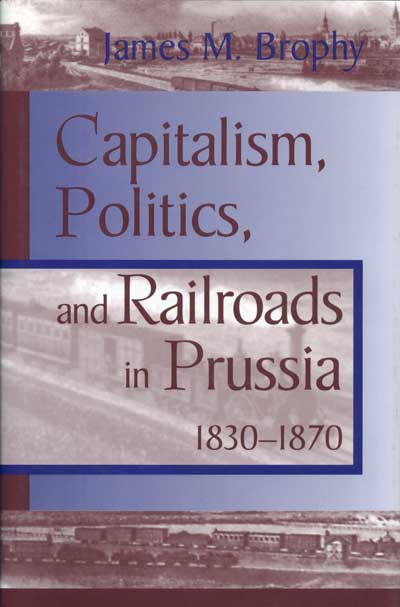Capitalism, Politics, and Railroads in Prussia, 1830�1870James M. BrophyHistorical Perspectives on Business Enterprise |
 3/18/1998 272 pp. 6x9  | |||
|
|
This work examines the politics of moneymaking in the railroad industry. Centering on the relationship of railroad entrepreneurs with the Prussian state during the industry’s critical phase of growth and consolidation, James M. Brophy describes how a capitalist economy was established within a political system stamped by Prussian conservatism. It provides a new view of business politics by exploring the political practices of railroad businessmen, who, in their aim to profit from Germany's largest industrial sector, both struggled against and cooperated with the Prussian state. The business politics of the railroad industry played a critical role in industrialization, state building, and bourgeois political culture. For this reason, Brophy’s political history of business elites contributes to a number of current discussions regarding the evolution of government-business relations, parliamentary and extraparliamentary politics, and Germany civil society. By cutting across the customary boundaries of business, economic, and political history, this book illuminates how business elites' search for a “mutual accommodation” between capital and political authority affected the political development of the Prussian-German nation-state. Using the railroad industry as the basis on which to construct a larger argument about the role of the capitalist class in reconstituting the Prussian-German state, Brophy breaks new ground in locating the informal, bureaucratic, and parliamentary political spheres businessmen infiltrated and the legislative issues they influenced. Materials culled from state and municipal archives, business archives, personal papers, newspaper and journal collections, and parliamentary reports enable this book to offer a broad political analysis of business activity. Capitalism, Politics, and Railroads in Prussia, 1830–1870 reassesses how business activity shaped political culture, and throws new light on the impact of the economy on state organizations. This study will interest scholars of modern German and European history, business history, and the history of the railroad, as well as those of political science and economics. James M. Brophy is an assistant professor of history at the University of Delaware. He has written articles for the Journal of Social History, History Today, and Central European History. | |||

